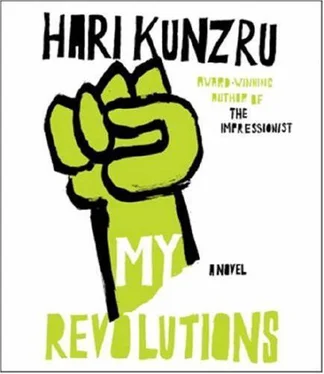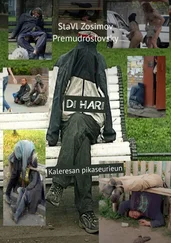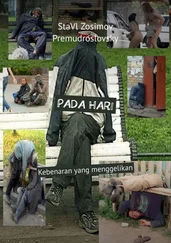New Year’s Eve was hard. Miranda had invited friends to dinner. Oliver and Rose ran a specialized organic farm and had a vdlkisch rude health about them that I’d always found slightly sinister. As an antidote to Rose’s braying laugh and Oliver’s fatuous opinions about the world beyond his orchard walls, I invited God, telling Miranda that otherwise he’d be on his own (which was true) and
would feel lonely (which I very much doubted). The others were all settled with drinks and snacks when he shambled in, bundled up in a thick overcoat and carrying his customary burden — twin plastic carrier bags stuffed with mysterious papers. Reluctantly he let Miranda prise them from his hands and store them in the hall closet, along with his coat, which she held as if it was potentially infectious. Collapsing into an armchair, he accepted a whisky and looked at me with heartfelt gratitude when I discreetly put the bottle next to him on the side table.
Sam went off to a house party with Kenny and some other friends, kissing everyone good night and wishing them a happy new year. During dinner I savored God’s table talk, intemperate monologues featuring the local council, people who phoned up to sell office supplies, and the makers of television game shows, against whom he nurtured a particular animus. He told us frankly that he despised vegetarians, then without missing a beat complimented Miranda on the risotto. He used the word “cunt” in a variety of inventive contexts. Oliver and Rose were cowed into submissive silence, exchanging panicked glances whenever God’s language became more than averagely degenerate. They took their revenge over coffee by instituting a game of charades. Miranda was already furious with me, so saying no was not an option. As God pretended to doze on the sofa, I found myself trying to mime the title of some American romantic comedy I’d never heard of, while Rose giggled behind her hand with moronic glee.
At midnight we sang a self-conscious verse of “Auld Lang Syne.” The party broke up soon afterward; Miranda stalked off to bed and I drove God home. Much later I was woken by Sam, who’d had a minor disaster, a flat battery, which meant she was stranded at her house party. I pulled some clothes over my pajamas and drove out to pick her up. The music was still booming, and through the door I had a brief glimpse of celebratory carnage, bodies and ashtrays and beer cans. She came running out to meet me, leaving some boy on the doorstep. As we drove home, scattering rabbits on the narrow country lanes, she told me she loved me and I told her I
loved her too and felt sick because it was yet another reminder of what was broken and couldn’t be fixed. Sure enough, when the phone rang the next day it was Miles. I was to meet him in London the following week. It would be an overnight visit; I should dress smartly. He made it sound like a job interview.
I spent the next few days craving heroin in a way I hadn’t for many years. The weather was atrocious. Rain beat down on the garden, leaving pools of water on the terrace. Three nights in a row I drank and watched daylight assemble itself behind the pear tree. New Year’s Eve had broken my truce with Miranda, and after Sam had taken the train back to Bristol we collapsed into the atmosphere of sullen hostility that had prevailed before she came home. On the morning of my trip, I watched Miranda standing at the kitchen counter eating a bowl of cereal and talking on the phone, trapping the handset between shoulder and jaw as she discussed packaging. If she noticed my combed hair or the jacket I’d retrieved from the back of the closet, she didn’t comment.
“You’re not wearing a tie,” Miles pointed out, when he met me at Victoria.
I shrugged. “I don’t think I own one.”
“You’re just saying that to annoy me. Still, you’ll have to do, I suppose.” We got into a taxi and he gave the address of a conference center just off Parliament Square.
“Are you going to tell me what we’re doing?” I asked.
“Patience is a virtue, Chris.”
“Oh, fuck off.”
It was a short journey, passed in silence. Outside the conference center Miles paid the driver and walked me through the foyer into a room set up for a press event. It was already half full of journalists and political staffers. Photographers were pacing about, talking into cell phones. TV crews hefted cameras onto tripods. Miles steered me toward the reserved seating in the front row. We were directly in front of the podium, where a long table was set up in front of a screen bearing the logo of the Home Office.
My nerves were on edge. I fidgeted in my seat and played with
the cuff buttons on my jacket. Just when I thought I couldn’t stand it anymore, the buzz of conversation died down.
A lot can change in thirty years. People who sat around at Lansdowne Road preaching revolution can start to speak the language of choice and competition. They can come to take an interest in efficiency, in productivity, in getting things done. The Right Honourable Patricia Ellis MP, Minister of State for Police and Security, was apparently here to make an announcement about crime figures. The overall trend was positive, thanks in large sum to measures she’d instituted, giving the cops greater resources and discretion and something else, to which I didn’t pay any attention because I was too busy looking at her, taking in all the ways she’d changed, the lines around her eyes, the crisp suit, the sensible middle-aged perm. What, I wondered, does Miles want with you, Patty Ellis? And how long is it, with all your rhetoric about cracking down and hitting targets and the challenges of the imminent new century, since you thought about the past, about the changes in a face you’d never expected to see again?
She scanned the room, making professional, impersonal eye contact, modulating her voice and illustrating her various successes with emphatic chopping hand gestures, like a martial artist breaking roof tiles. The people alongside her, civil servants, a ministerial junior, looked on with the requisite expressions of bovine admiration. Miles had positioned me so I was directly in her line of vision. Once, twice, she looked directly at me, but there was no flicker of recognition.
OCCUPATION OF CHATSWORTH MANSIONS: HOUSE THE HOMELESS!
Nowhere to live? Come to Chatsworth Mansions: 120 luxury flats built three years ago are lying empty while thousands in this country are homeless or live in slums.
1868: The Workhouse
1968: Local Government Hostels
Some things never change unless you force them.
Across Britain speculators are keeping buildings empty to make vast profits. We say this is wrong.
We have occupied this building to protest at a system which deprives some of shelter while others wallow in money. Though it is a symbolic gesture and we will leave after 24 hours our anger is real.
HOUSE THE HOMELESS! HOUSE THE HOMELESS! HOUSE THE HOMELESS!
Patty and I stood on the roof of the block and looked down at the crowd. A couple of police cars had arrived and a man with the pinched look of a local news photographer was perched on a wall, trying to take our picture.
* * *
“He’ll need a longer lens,” she noted drily. “He’ll never get anywhere with that.”
“Do you think there’s enough of a crowd?” I asked.
“Not yet.” She peered over the parapet. “I don’t see many press people.”
I blew on my hands. It was a freezing November morning. We’d been up there for two hours. There were about fifty of us. Hats and gloves, Thermos flasks, red noses. We were waiting for something to happen, poking the city’s corpse a little to see if it moved. In front of us, east London stretched away into the distance, the gray expanse of Hackney Marshes pocked with chimneys and skeletal Victorian gas towers. The block had been built with a flat roof, and we’d draped a banner across the façade.
Читать дальше












